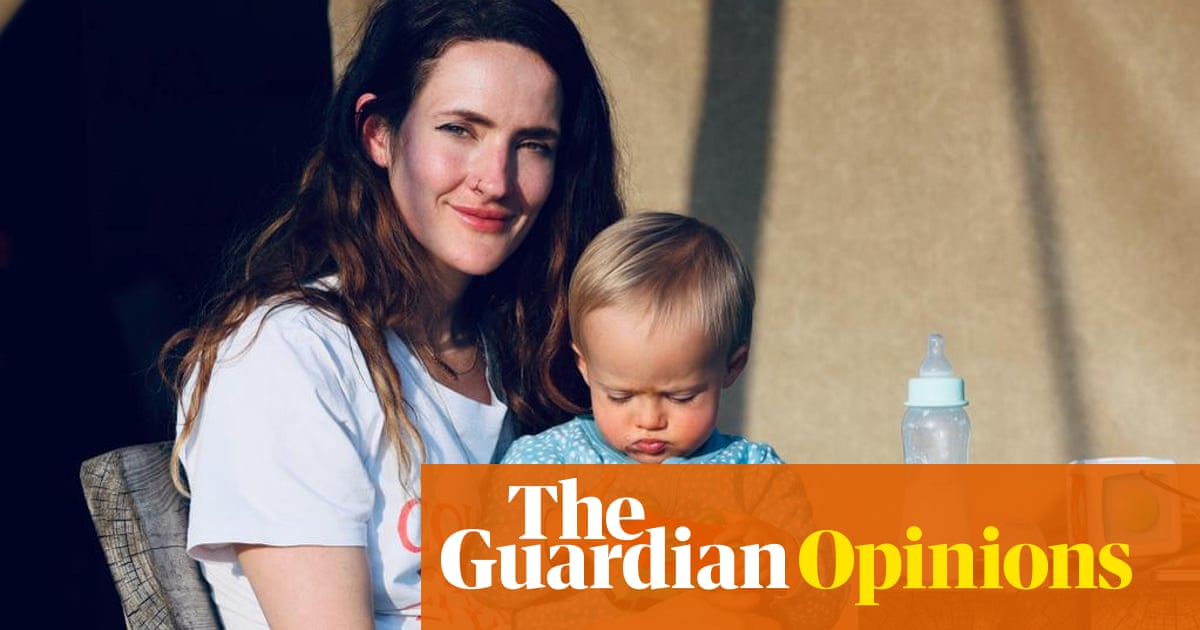
vni Doshi did not have children when she started writing what would become her debut novel, Burnt Sugar – in fact, she was deeply unsure about whether she wanted them. Over eight drafts in almost as many years, Doshi wrote through her indecision, telling the story of a difficult mother-daughter relationship that is defined by ambivalence on both sides. After submitting her final manuscript in 2018, she gave birth to a baby boy.
When her novel – which was nominated for this year’s Booker prize on Tuesday – was first published in India last year, under the title Girl in White Cotton, Doshi was nervous about revisiting her visions of parenthood. But she was pleased by her own accuracy, even a bit unsettled by it. Her main character, Antara, experiences postpartum depression, as Doshi did.
“I was a bit baffled by the physicality of the experience of becoming a mother,” she says, from her home in Dubai, her husband’s home town. “I had never considered it that deeply outside of my characters. I didn’t imagine, ‘I’m going to be living through some of that’ … Something in my unconscious may have come up that knew what I was going to experience ahead of time.” Given that her book centres on a very dysfunctional relationship between a mother and child, even Doshi is uneasy about the prospect of being proved right again: “I’ve written this now – is it going to come true?”
Burnt Sugar is an unsettling, sinewy debut, startling in its venom and disarming in its humour from the very first sentence: “I would be lying if I said my mother’s misery has never given me pleasure.” Set in Pune, India, the story follows Antara as she reckons with her mother Tara’s cognitive decline and the boiling resentment she still feels over being neglected. As a girl, Antara suffered at the whims of her rebellious young mother, who ran away from her middle-class upbringing to join an ashram, where a guru espoused free love and freer sex. Antara’s name alone – Antara, of Tara, un-Tara – stands as testament to both her mother’s egotism and impetuousness, and their unbreakable tie. As adults, neither woman can stand to be with the other for long, nor can they escape each other. The push-and-pull of their relationship has reverberations for Antara’s art, marriage and views on children, all amplified by Tara’s memory loss even while Antara refuses to let her forget.
The novel has earned praise from Fatima Bhutto, Elizabeth Gilbert and Olivia Sudjic, and seen Doshi compared to Jenny Offill and Deborah Levy. And in the same week it is published in the UK, Burnt Sugar has been announced as one of eight debut novels up for this year’s £50,000 Booker prize, with the judges describing it as an “utterly compelling … sometimes emotionally wrenching but also cathartic”.
When Doshi’s editor called her to tell her the news, she “had to take a moment to lie down and make sure I was still in my body. It was surreal to hear the words. I didn’t think it was possible – I’ve always thought of myself as an outsider.” The achievement is all the more sweet given her long road to publication: “I knew nothing about craft, I knew nothing about writing – I was completely in the dark when I began.”
Born in New Jersey to Indian parents, Doshi studied art history in New York and London before moving to Mumbai, where she worked as a curator. There, in 2012, she rattled off the first draft of her story in a month to meet the deadline for the Tibor Jones South Asia prize for an unpublished manuscript. The five judges unanimously voted her the winner, earning her literary representation – and extensive notes from her new agent.
“I wish I could tell you that it was this slow, beautiful process, that I was homing in on something as clear as a diamond,” Doshi says. “But it was a big mess.”
Over seven years, she wrote eight substantively different drafts (which she has since turned into a conceptual art piece, hanging in her study as a “record of those years of failing,” she says, laughing). The key that unlocked the story was Antara’s voice: caustic, funny, her bitterness towards her mother sometimes giving way to grief. “I was trying to be true to her, trying to get in her head as much as possible,” says Doshi.
She was also inspired by her mother’s family’s connection to the Osho ashram in Pune, founded in 1976 by the controversial guru Bhagwan Shree Rajneesh – the subject of the Netflix documentary Wild Wild Country – before he relocated to the US to form Rajneeshpuram in Oregon. But Doshi emphasises the “long list of ways” in which the story differs from her own life – not least among them, the fact that she and her mother “are very much on good terms”.
On Tuesday, the Booker judges described the relationship at the heart of Burnt Sugar as “complex and unusual”. While Antara and her mother may be extreme characters, Doshi believes readers may be able to relate to their intensity of feeling and the way they mirror each other against their wills. As Antara describes it: “There was a breakdown somewhere about what we were to one another, as though one of us were not holding up her part of the bargain, her side of the bridge.” Maybe, she concludes, the problem is they are both standing on the same side.
“Even if you have a relatively good relationship with your mother, the maternal complex is so deep-seated in the psyche, any kind of conflict or difficulty with the mother can lead to a fragmentation of one’s own self,” says Doshi. She has realised the truth of this only since writing Burnt Sugar and becoming a mother herself.
Readers may find themselves feeling claustrophobic and deeply uncomfortable as Antara and her mother tussle over whose version of her childhood takes precedence. Some reviewers have even suggested that Burnt Sugar belongs to the horror genre. Doshi has been surprised by some of the reactions: “People have said to me there’s something thriller-like about it: ‘I had a stomach ache reading it, I felt my heart beating.’ I definitely didn’t think about it as being suspenseful.”
Some criticisms Doshi has felt comfortable about dismissing out of hand, including those of one man who thought the male characters were peripheral. “It’s a specific kind of privilege when you expect to see your reflection in every surface,” she says. “The comment says more about him than it does about me and the book.”
Indeed, Burnt Sugar highlights how rarely mother-daughter relationships are explored in depth. Doshi was emboldened by Rachel Cusk and Sheila Heti, authors who treat the subject of “being mothers and being mothered with a sustained seriousness”, and indeed, ambivalence.
In 2017, Doshi wrote an essay for Harper’s Bazaar India about feeling undecided on whether to have children, which sparked a backlash from her family. “I saw how it brought out different sides of all the women I knew,” she says. “There was a lot of fear about my ambivalence. Maybe they all were worried that it was contagious.”
Her mother-in-law contacted an astrologer, who said Doshi was going to have two children – “So there was ‘no point fighting it’,” Doshi recalls. True enough, her son is now two and, a week after we speak, Doshi gave birth to her second child, a girl.
“The more I grow into being a mother, I realise that so much about it has been about tradition, fear, family, pressure – probably a kind of narcissism,” Doshi says. “There’s all of these different sides of myself that I have been coming face-to-face with through the process, that I thought had nothing to do with my decision.”
Motherhood is “such a large, expansive word – it almost means nothing”, says Doshi. She is not yet at work on a new novel, but she wonders how she will go on to treat the subject in future: “I wonder if, now, I’m too close to it. Maybe I have more blindspots today than I did before having children.”
• Burnt Sugar is published by Penguin Random House on 30 July.












